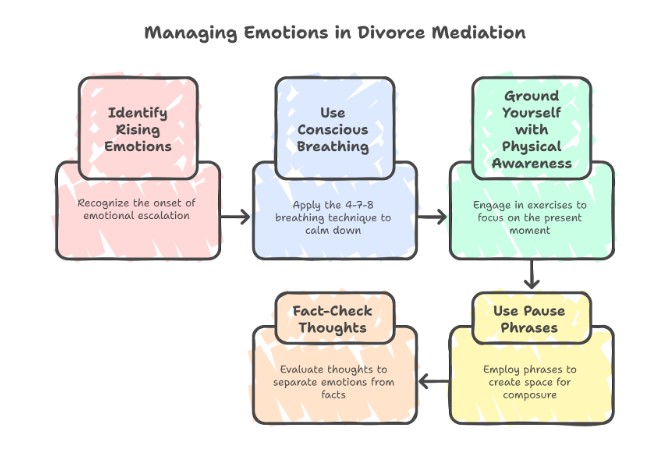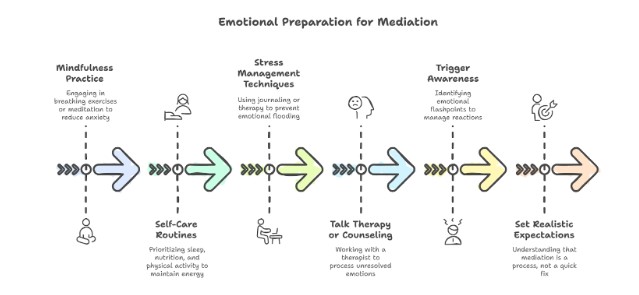Divorce mediation can stir up intense emotions that can throw conversations off track and hinder the formation of fair agreements.
When someone feels triggered in these sessions, they may lash out, shut down completely, or make choices they’ll regret later.
Learning to spot and handle emotional triggers during mediation helps divorcing couples get better results and cuts down on stress and conflict.
Mediation digs into deeply personal stuff: finances, kids, and the collapse of a relationship. These topics naturally stir up pain, fear, and resentment.
Divorce mediation can be emotionally exhausting, but a little preparation and self-awareness go a long way.
Knowing how to get ready emotionally before mediation and what to do when you’re triggered can make the difference between a session that works and one that falls apart.
Key Takeaways
- Emotional triggers are normal in mediation—but they can be managed.
Recognizing your reactions is the first step toward staying calm and in control during tense conversations. - In-the-moment tools, such as breathing, grounding, and pausing, reduce escalation.
Simple techniques help you respond thoughtfully rather than react impulsively. - Emotional preparation before mediation improves outcomes.
Mindfulness, therapy, and support networks strengthen your ability to communicate under pressure. - Working with a skilled mediator like Anna Krolikowska creates emotional safety.
Guided sessions help keep both parties focused, respectful, and on track toward resolution.
Understanding Emotional Triggers In Divorce Settings

Emotional triggers in divorce manifest as specific situations, words, or memories that evoke strong emotional reactions during the mediation process.
Triggers like these can significantly impact decision-making and communication.
Examples Of Common Emotional Triggers
Financial Discussions Can hit a nerve for many people. Money talks bring up fear, anger, and a sense of unfairness. Fighting over finances can unearth old resentments and feelings of inadequacy.
Child Custody Topics often lead to emotional outbursts. Parents might feel protective or threatened when it comes to parenting time.
These conversations tap into deep worries about losing their kids or missing out on their lives.
Shared Memories can catch people off guard. Discussing the family home, vacations, or special events can sometimes evoke a wave of sadness or anger.
Triggers like these come from memories and shared experiences, making anxiety spike.
Communication Patterns from the marriage tend to spill right into mediation. A certain tone, a familiar phrase, or an old argument can instantly put someone on the defensive.
Even simple discussions can suddenly feel weighed down by old baggage.
Future Planning can be scary. Conversations about living arrangements, dating, or lifestyle changes bring the reality of the situation into sharp focus.
It’s honestly overwhelming for most people.
Hard conversations don’t have to spiral out of control. Anna Krolikowska’s divorce mediation services help you stay grounded—even when emotions run high. Contact us to schedule your first session.
Managing Your Response In The Moment

Managing your response in the moment during divorce mediation is often the difference between moving forward and breaking down.
When emotions rise, your ability to stay grounded helps keep the conversation productive, respectful, and centered on resolution. The goal isn’t to avoid feelings—it’s to manage them skillfully.
Why your immediate response matters
Mediation involves sensitive topics: parenting, finances, and years of emotional history. A small comment or shift in tone can trigger defensiveness or even anger. But reacting without thinking can escalate the conflict or cause communication to shut down entirely.
Instead, you need simple tools that help you pause, refocus, and stay present—even under pressure.
Quick tools to de-escalate emotional reactions
1. Use conscious breathing to calm your nervous system.
Try the 4-7-8 breathing technique: inhale through your nose for 4 seconds, hold your breath for 7 seconds, and exhale slowly for 8 seconds.
This simple method slows your heart rate and interrupts the stress cycle before it takes over.
2. Ground yourself with physical awareness.
When you feel overwhelmed, shift your focus to the present moment:
- Name five things you can see
- Feel your feet pressing into the floor.
- Gently count backward from 10
- Notice how your hands feel resting on your la.p
These grounding exercises help your brain reorient away from anxiety or anger.
3. Use “pause phrases” to buy time.
Saying, “Let me think about that,” or “Can we take a short pause?” gives you space to regain composure without derailing the session.
4. Fact-check your thoughts.
When triggered, ask: “Why happened, and what am I feeling about it?”
This helps separate emotional reactions from the facts—and keeps you focused on resolution, not reactivity.
How Mediation Can Be Structured To Reduce Emotional Intensity
The mediation process can be structured in ways that help people remain calm and focused. Good mediators think ahead to create a safer space for decision-making.
Mediation Features That Support Emotional Regulation
1- Physical Environment Setup
The room matters more than people realize. Mediators often use round tables instead of putting folks face-to-face in a standoff.
Soft lighting and comfy chairs help people relax a bit. Some mediators even keep tissues and water within easy reach.
2- Session Timing and Breaks
Mediation strategies typically involve shorter sessions, lasting 90 minutes or less. That’s about as much as most people can handle before emotions start getting the best of them.
Breaks are crucial. Mediators often step in and call for a pause when tensions escalate.
3- Ground Rules and Structure
Clear rules help everyone know what’s coming. Mediation typically begins with guidelines on respectful communication.
Key Ground Rules:
- Only one person talks at a time
- No name-calling or insults
- Stick to solutions, not blame
- Take a break if you need it
4- Communication Protocols
Divorce mediation tips suggest using “I” statements instead of “you” accusations. Mediators teach people to discuss their feelings without resorting to attacks.
Some mediators ask people to jot down their main concerns before they speak. This helps keep thoughts organized and tempers in check.
Struggling to manage stress during negotiations? Anna Krolikowska helps clients build emotional readiness before every mediation session. Reach out today to start preparing with confidence.
Helping Your Co-Parent Manage Their Triggers Without Escalation
Supporting your co-parent through their triggers protects everyone, including the kids. Co-regulation involves managing emotions together, rather than getting stuck in conflict.
Use Active Listening Techniques
Active listening demonstrates respect for your co-parent’s feelings. Listen without interrupting or planning your response.
Repeat back what you heard, just to confirm you understood. This lowers defensiveness and opens the door for better conversations about custody.
Stay Calm When They Get Upset
Your mood rubs off on them, like it or not. One person’s reaction triggers the other, and suddenly it’s a cycle.
Keep your voice steady. Try not to cross your arms or roll your eyes.
Focus on Shared Goals
Remind each other what matters. Both of you care about the kids and want things to be fair.
| Instead of Saying | Try This |
| “You’re being unreasonable.” | “Let’s find what works for the kids.” |
| “That’s wrong.” | “I see it differently.” |
Set Clear Boundaries
Setting boundaries in co-parenting keeps everyone’s emotions safer. Be clear but polite about what you’ll accept.
Walk away from conversations that get nasty. Suggest a break if things start to boil over.
Pre-Mediation Emotional Preparation Strategies

Emotional preparation for mediation is just as important as organizing your paperwork—perhaps even more so.
You’re not just negotiating terms; you’re confronting difficult emotions, personal history, and decisions that shape your future. The stronger your emotional foundation, the smoother the mediation process will be.
Many clients focus solely on documentation and legal logistics, but walking into mediation emotionally unprepared can cause even the most straightforward discussions to unravel.
Preparing your mind and heart enables you to respond with clarity rather than reacting from pain or frustration.
Here are essential emotional readiness strategies to include in your divorce mediation checklist:
Mindfulness practice
- Try breathing exercises, meditation, or quiet walks.
- Helps reduce anxiety, boost attention, and regulate emotional responses
Self-care routines
- Prioritize sleep, nutrition, and light physical activity
- Keeps your energy and emotional resilience high during multi-session mediation
Stress management techniques
- Journaling, therapy, or support groups
- Prevents emotional flooding and allows space for calm reflection
Talk therapy or counseling.
- Work with a therapist to process unresolved anger, grief, or fear.
- Build confidence to speak your truth without spiraling into conflict.
Trigger awareness
- Identify your emotional flashpoints before the session.
- Discuss with your attorney so they can help guide you back to center.
Set realistic expectations
- Mediation won’t resolve every issue in one session.
- Aim for progress, not perfection.
Conclusion
Divorce mediation isn’t just paperwork and negotiation. It throws some real emotional curveballs, and you’ll need specific strategies to handle them.
The techniques in this guide offer practical ways to stay grounded during mediation. Some are simple, while others might take a bit of practice.
Managing emotions during divorce mediation takes some honest prep and self-awareness. When people walk in mentally ready, they usually move through sessions with fewer bumps.
Staying focused on solutions, rather than rehashing old arguments, keeps the process moving forward. Emotional regulation—yeah, it’s not always easy—lets everyone communicate more clearly.
If both sides can separate their feelings from the choices they need to make, mediation can be an effective approach. These strategies help people keep that line clear, even when it gets tough.
Want a divorce process built on respect, not reactivity? Anna Krolikowska offers calm, structured collaborative divorce solutions. Schedule your confidential consultation today.
Frequently Asked Questions
Why is emotional preparation important for divorce mediation?
Emotional preparation for mediation helps you stay calm, think clearly, and respond effectively rather than react impulsively. It sets the tone for respectful conversation and better decision-making throughout the process.
What are the best ways to manage emotional triggers in mediation?
To manage emotional triggers in mediation, try deep breathing, grounding techniques, and short pauses. Naming your feelings and checking your internal narrative helps prevent emotional reactions from taking over.
How can I prepare mentally for mediation sessions?
Prepare mentally by practicing mindfulness, identifying emotional triggers, journaling concerns, and setting realistic goals. Speaking with a therapist before mediation can also help reduce emotional overload.
Can a mediator assist me if I become emotional during the session?
Yes. Skilled mediators like Anna Krolikowska know how to manage emotional moments by slowing the pace, creating space for reflection, and helping both parties stay focused on solutions.
What should I do if my ex triggers me during mediation?
If your ex triggers a reaction in you, pause before responding. Use calm body language, take a breath, and ask to regroup if needed. Grounding exercises or neutral phrases, such as “Let me think about that,” can help de-escalate the moment.
Is it normal to cry or feel overwhelmed in mediation?
Yes. Feeling emotional during mediation is completely normal. The key is learning how to navigate those feelings without letting them take control of the session. Emotional moments often lead to breakthroughs when handled well.


